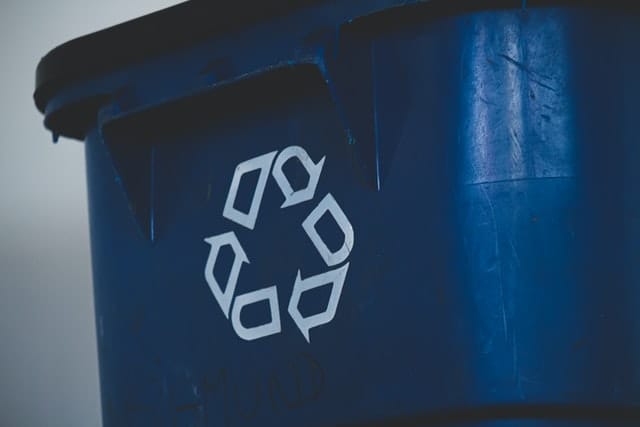How to Set Up Effective Recycling in the Workplace
In recent times, at 247 Waste Removal, we know that recycling and waste management become ubiquitous tasks in our daily lives.
But whilst we separate our rubbish, recycling has fast become a convoluted political and economic matter.


Protesters and activists are vocalising the importance of global warming to the public and corporations. Irreparable environmental problems are no longer concerns for future generations to manage.
Businesses can create huge positive change by setting up effective recycling systems. It’s such a simple way to reduce landfills, harmful gases, and mass production of futile products and their packaging.
For professional help, consider our office clearance service or commercial waste collection.
Now, read all about the importance of workplace recycling, whether zero-waste is beneficial, and how to set up a successful recycling system within your business in addition to legal responsibilities.
WHAT IS RECYCLING IN THE WORKPLACE?

Recycling is the process of collecting and reusing waste, which might have otherwise been thrown into landfills.
There are several benefits to recycling for your business, community, and overall environment.
- Decrease waste sent to incinerators and landfills.
- Conserve natural, finite resources.
- Reduce pollution levels.
- Increase economy by using domestic materials.
- Save overall energy.
READ: DISPOSE OF YOUR OFFICE EQUIPMENT IN AN ENVIRONMENTALLY SOUND WAY
WHY IS RECYCLING IMPORTANT?
Now more than ever, recycling needs to become a collective way of life.
The consequences of mass wastage are damaging our planet at lightning speed. Humans have a direct impact on the environment, which creates irreversible damage.
According to scientists, climate change is close to the point of no return. And global warming is causing habitants – and their lands – to become extinct in front of our eyes. But yet we still fuel and feed toxins to the planet.
You might think a workplace recycling system is nothing compared to the grand scale of life. But each and every step towards healing the planet is as beneficial as the last.
HOW TO SET UP A WORKPLACE RECYCLING SYSTEM

It might sound like a complicated task, but it’s worth the effort. Setting up a recycling system in the workplace has great economic and social benefits for your business.
With the right guidance and equipment, you can comply with health and safety duties for both your business and the environment. Here are steps on how to set up a workplace recycling system:
IDENTIFY YOUR WASTE MATERIALS
The first thing to do is to identify all areas of physical waste that your business makes. This includes office spaces, communal areas, and outdoor places.
Collect data on what waste materials are found in each office area and the right recycling station to send them to. These stations can include paper, plastic, and consumables.
It’s really useful to place stations in a suitable location. With easy access, employers will directly use them and produce less mixed waste.
DON’T OVERCOMPLICATE YOUR SYSTEM
When planning any business project, it’s important to avoid overcomplicating your systems.
If the process becomes difficult to understand or has too many steps, it’ll prevent people from using it.
Remember to follow a recycling plan, keep it simple, and encourage people to use them daily. You can even offer incentives and prizes for departments that use the system efficiently.
ORGANISE, ORGANISE, ORGANISE!
It’s so essential to keep your waste organised, be it for your established office or when about to move. If you let things slip, the whole system will soon follow and ruin your hard work.
Label your recycling stations clearly, outlining which waste is suitable to place inside.
If you simplify the separation process, you can significantly cut down costs and meet your company’s moral obligations.
Executing an efficient internal communication strategy is essential to implement principles company wise, thus it’s best to assign someone to coordinate the implementation and running of your recycling system in order and on time. They’ll be able to keep on top of maintenance and bring up any requests or issues they come across. Delay, especially of organic rubbish, could lead to pest issues like office mice, as they love free food.
CUSTOMISE YOUR PROCESS
Your business will have its own type of waste, amount, and management process. So, you should customise your process to suit waste production.
Some ways of customising your process include:
Use bins that suit your waste amount.
Placing stations in accessible areas.
Upcycling where you can.
Modifying each station with individual designs.
Using recycling graphics and labels to build awareness.
ZERO-WASTE OR RECYCLING?
Zero-waste is when you actively consider how products can be made, and whether waste can be eliminated completely.
The practice only considers recycling as a last resort.
Here are a few steps to implement zero-waste practices in the office:
- Plan your zero-waste office
- Spotting areas of waste
- Implement zero-waste policies
- Replace single-use plastic cups with reusable ones.
- Invest in durable materials and products.
- Manage your food waste through composting.
- Implement a filter to use tap water instead of water dispensers.
- Introduce catering, which is free from packaging.

KEEP YOUR RECYCLING SYSTEM GOING

Sustainability is important now more than ever. No matter how big your company is or what you produce, it’s your moral duty to reduce your carbon footprint.
Every action towards solving environmental issues collectively matters. So, businesses should stand to personify the importance of recycling and sustainability.
Lead by example and practice what you preach. If you protect your system, you can simultaneously protect the planet.
